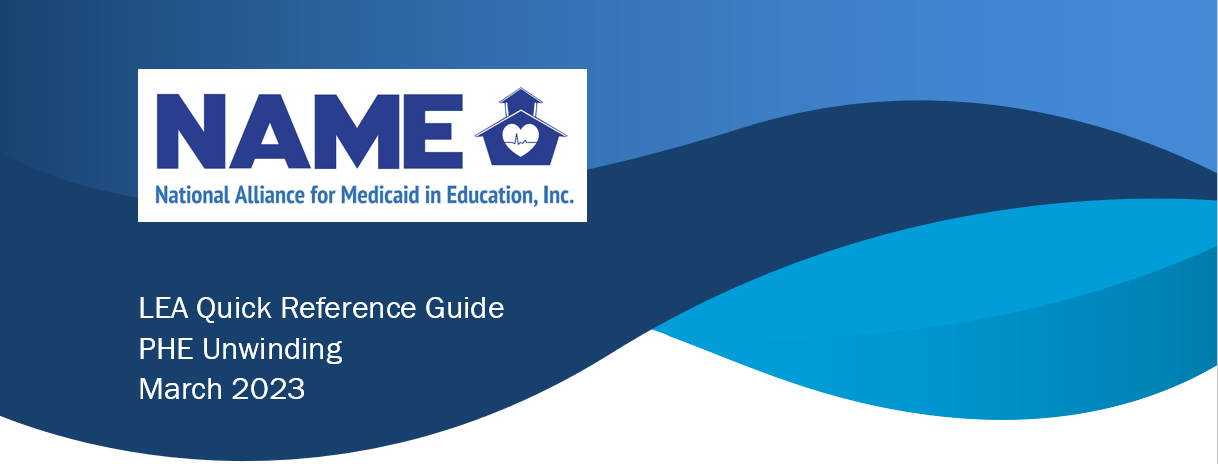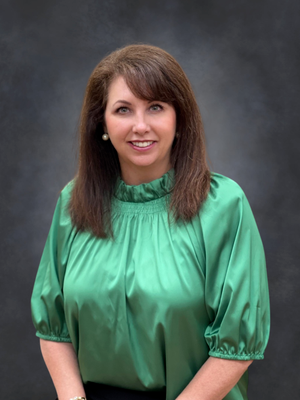Breaking News
Register Now for the 22nd Annual NAME Conference
- Details
New Guidance Released!
- Details
Yesterday was a celebration! Today is about action!
Yesterday we celebrated the release of the new guide. It was a monumental day for our field. The Bipartisan Safer Communities Act charged CMS with this task. It allowed opportunities for NAME to engage in meaningful conversations around challenges and barriers. We received a call from CMS thanking our organization for the part we played in its development. We began conversations with CMS, in reference to this guide, last July. We were thankful that they were willing to participate in our conference, where many of you were able to ask specific questions and share your barriers. NAME was asked toform specific focus groups over the past several months and many of you were willing to participate. Thank you for your willingness to contribute to the process and share your experiences.
Today is about action! We will reread with purpose. As we read, we will make marks, take notes, and start a list of questions. If you do not have a collaborative network that includes your State Medicaid Agency, State Department of Education, and LEAs, we strongly encourage you to form one. If you do have an established system of communication, we urge you to work collectively to share this information and to plan a series of opportunities where stakeholders might thoughtfully review your current plan, the flexibilities that are explained in the guide, and how these might impact your state. The next three years will be critical to formulating the best possible plan for each state.
NAME is here for its members! We have been planning opportunities to discuss the new guidance. You should have received an email yesterday with an invitation for two upcoming webinars. Please make plans to participate! Do your part by sharing this with colleagues and interested parties. We also have links on Facebook and Twitter to increase the distribution of information. Additionally, we are also actively preparing a robust conference agenda that you will not want to miss! Be sure to make plans to attend and register soon. Please stay engaged. We want to hear from you and support you. You will be hearing from us!
Quick Reference Guide
- Details

Healthy Students Learn Better! Schools Can Help!
Quick Facts
- Public Health Emergency (PHE) will expire on 5/11/2023.
- Continuous coverage requirement ends as of 4/1/2023.
- Medicaid redeterminations begin on 4/1/2023.
- Redetermination timelines will vary by state. See map for details.
- Enhanced Federal Medical Assistance Percentage (FMAP) will begin to phase out, and fully expires 1/1/2024.
- It is estimated that between 5 – 14 million people could lose their Medicaid coverage.
- A reduced Medicaid eligibility rate will impact school-based Medicaid claiming reimbursements.
- Medicaid outreach is reimbursable via Medicaid Administrative Claiming (MAC) programs, as activities will be captured in Random Moment Time Study (RMTS), for LEAs that participate in MAC.
Next Steps
- Local Education Agency (LEA) point of contact: your State Medicaid Agency.
- Don’t wait! Update! Encourage enrollees to update their address. Undeliverable mail will be a significant challenge.
- Educate Medicaid and CHIP enrollees about the upcoming changes, using available toolkits:
- CMS Toolkit.
- AASA Educator Toolkit.
- Georgetown CCF Toolkit.
- Insure Kids Now Back to School Toolkit.
- State-specific toolkits may also be available at the State Health & Value Strategies state toolkit repository, or on your State Medicaid Agency website.
Stay Informed
- NAME/CASE PHE Unwinding Webinar.
- Join the CMS National Stakeholder Calls. For more information about these calls, you may email: This email address is being protected from spambots. You need JavaScript enabled to view it.
- CMS resources.
Announcement from AASA, The School Superintendents Association:
- Details
The bipartisan Safer Communities Act that passed to prevent gun violence last week included language requiring CMS to issue new school-based Medicaid guidance before June 2023. The guidance does EXACTLY what we have been asking CMS to do for years and even does more than what we had hoped for in that it provides direct grants to states to start the hard, but meaningful work of changing how they process Medicaid claims, find ways to dramatically expand Medicaid-reimbursable services to schools, and generally take advantage of the new flexibilities that they will be granted via updated guidance to expand healthcare, particularly mental health services, to millions more children.
This is going to be totally game-changing for states, for districts and most importantly for KIDS.
Here are the specifics (which you can also find starting on page 11 here)
- Update the Medicaid guidance from 1997 and 2003
- Clarify that a State should take steps to allow a district to bill for any EPSDT service they provide
- Outline strategies/tools that reduce the administrative burdens on, and simplify billing for local educational agencies, in particular small and rural LEAs, and support compliance with Federal requirements regarding billing, payment, and recordkeeping, including by aligning direct service billing and school-based administrative claiming payments
- Include a comprehensive list of best practices and examples of approved methods that State Medicaid agencies and local educational agencies have used to pay for, and increase the availability of, assistance under Medicaid, including expanding State programs to include all Medicaid-enrolled students, providing early and periodic screening, diagnostic, and treatment (EPSDT) services in schools, utilizing telehealth, coordinating with community-based mental health and substance use disorder treatment providers and organizations, coordinating with managed care entities, and supporting the provision of culturally competent and trauma-informed care in school settings; and
- Provide examples of the types of providers (which may include qualified school health personnel) that States may choose to enroll, deem, or otherwise treat as participating providers for purposes of school-based programs under Medicaid and best practices related to helping such providers enroll in Medicaid for purposes of participating in school-based programs under Medicaid. (note: this is essential for ensuring critical school personnel like school psychologists can bill Medicaid and was NOT something CMS was planning to clarify in their guidance based on our most recent conversations with them).
- Create a NEW TA Center—in consultation with ED—with $8m in seed money so districts and states aren’t lost about how to do school-based Medicaid any more. Further, the TA Center has to report to Congress on the areas where the most TA was requested to ensure that CMS is accountable and responsive to stakeholder needs.
- $50m in grants to States for the purpose of implementing, enhancing, or expanding the provision of assistance through school-based entities under Medicaid or CHIP.
Despite this amazing victory-- the work continues. We must continue to urge ED to reduce barriers to accessing Medicaid services in schools through changes to FERPA and parental consent requirements as well as urge CMS to follow this law (I love writing that!) and be more aggressive in promoting free care, removing TPL barriers, and more, but this is a great and unexpected new policy that we should all be proud of and celebrate.
How Medicaid can Help Support Students' Mental Health
- Details
Districts across the country are using federal COVID relief aid to bring mental health professionals into schools. But this unprecedented infusion of federal aid also creates a challenge: how to sustain new school staff positions when the funding expires at the end of 2024. In this analysis, Phyllis W. Jordan and Bella DiMarco of FutureEd, an independent, nonpartisan think tank at Georgetown University’s McCourt School of Public Policy, and Anne Dwyer of the McCourt School’s Center for Children and Families explain how Medicaid, the federal-state partnership that already provides health care for millions of public school students, could be part of the solution - as long as states take the necessary steps to use it and federal agencies back them up.
Mental Health Matters: Highlighting Mental and Behavioral Health Services Covered through Medicaid and CHIP
- Details
For resources to help organizations address the youth mental health crisis, check out the most recent Campaign Notes eNewsletter from CMS and the Connecting Kids to Coverage National Campaign:
https://www.insurekidsnow.gov/newsletter/2022/05/26/index.html.
Executive Director
- Details

The National Alliance for Medicaid In Education is pleased to announce the selection of our new Executive Director, Jenny Millward, ED. D.
Jenny brings with her 29 years of experience in special education and childhood disability advocacy in such roles as a special education teacher, Program Specialist for Speech Language Pathology and Director of Student Services at Houston County Schools in Georgia. In addition to her impressive career experience Jenny has also been an active member of G-CASE, CASE, and CEC since 2004, including holding the Legislative Committee Chair position for G-CASE since 2018.
NAME eagerly anticipates a thriving partnership with Jenny to promote integrity, collaboration, and success for its members. Welcome Jenny!
To connect with Jenny:
Dr. Jenny Millward, Executive Director
National Alliance for Medicaid in Education
This email address is being protected from spambots. You need JavaScript enabled to view it.
478-808-1021
From the Center for MH & Student/Learning Supports at UCLA
- Details
Embed School-based Services into a Unified, Comprehensive, and Equitable System of Student/Learning Supports
Last week we noted that the increased concern about the impact of the COVID-19 pandemic has resulted in many well intentioned initiatives and policy reports that, unfortunately, limit discussion to integrating and expanding school‑based health services. The latest push is seen in the federal launch of a joint‑department effort to expand school‑based health services.
We raised the following caution:
While the focus on school‑based services is a necessary piece of addressing barriers to learning and teaching, it is just one facet of what schools need. And focusing on it in isolation of what else is needed has unfortunate consequences for students and schools.
This caution produced queries about what we think needs to be done. Recent reports and other resources may be accessed HERE in the Online Resource Catalogue. Below is a sample of the most recent reports:
How School Boards Can Pursue New Directions to Help Schools Address Barriers to Learning and Teaching http://smhp.psych.ucla.edu/pdfdocs/boardrep2022.pdf.
We won't Argue Against Adding More Counselors,
BUT ...
Addressing Student Mental Health Concerns Involves Much More than Increasing the Number of Mental Health Providers http://smhp.psych.ucla.edu/pdfdocs/morethan.pdf.
2021‑22: Addressing Learning, Behavior, and Emotional Problems Through Better Use of Student and Learning Support Staff http://smhp.psych.ucla.edu/pdfdocs/supports.pdf.
For free access to three recent books detailing the policy and practice changes that can transform how schools address barriers to learning and teaching and reengage disconnected students and families, visit:
http://smhp.psych.ucla.edu/improving_school_improvement.html.
